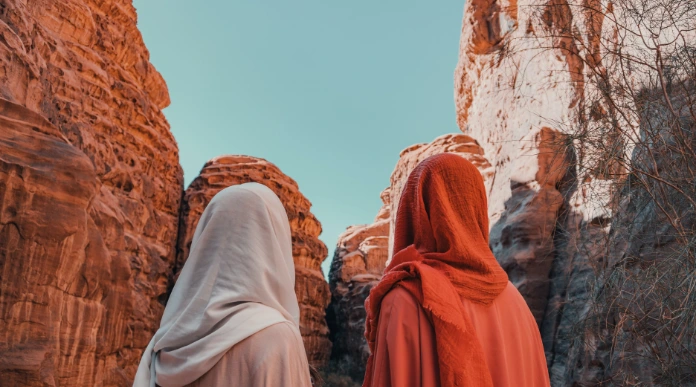The FIFA World Cup is much more than an event. It reveals worldwide unity, cultural exchange, and love for shared values. To be a host, a country needs to depict itself as one that accommodates everyone and is open-minded, respectful to diversities, and friendly to everyone. While Saudi Arabia is trying to modernize and present itself as a global hub, its persistent censorship of art, music, and cultural expression raises significant concerns regarding its suitability to host the FIFA World Cup in 2034.
Cultural Censorship: A Barrier to Global Expression
For decades now, the kingdom of Saudi Arabia has attracted very stern criticism for its very strict culture of expression. The country has quite a controlled cultural expression through its three main sources: art, music, and theatre. It does this by curbing creativity, thereby restraining a person’s rights to express, celebrate, and share their rich culture, an element that enhances the lively atmosphere of the World Cup.
Art that opposes the mainstream and is sensitive in character or ideas is outrightly banned or highly restricted. For instance, art that depicts nudity, political dissent, or religious diversity cannot be allowed. Such restrictions do not resonate with the spirit of the World Cup since it celebrates differences and freedom of expression by bringing people together through the diverse tapestry of global cultures.
Ban on Music and Entertainment
Even with the recent reforms, allowing public concerts and establishing entertainment hubs, it is apparent that the base of restrictions remains in place. Lyrics and performances are carefully scrutinized to ensure that they are consonant with the values of a conservative Kingdom, often eliminating the politically charged and socially progressive themes.
There is also a constraint in genres of music that are not conventionally acceptable to get into mainstream media. This sanitizes the cultural environment from all the vibrant diversity needed to be exhibited for an event such as the World Cup when fans from international destinations bring with them their distinct cultural expressions and expect the host nation to embrace it in its entirety.
The FIFA World Cup offers an unparalleled platform for cultural dialogue, where art, literature, and ideas from around the world can intermingle. However, Saudi Arabia’s censorship laws impose severe limitations on public discourse. Books, films, and theatrical performances undergo strict government approval processes, leading to the suppression of works that challenge conservative ideologies or promote alternative viewpoints.
Rules are even enforced at concerts in 2025, such as bans on dancing and “immodest clothing.” This is done to maintain public decorum in the face of some form of entertainment.
Gender Bias in Cultural Life
Gender inequality in the expression of culture is one of the most stringent challenges that Saudi Arabia faces. The country has tried hard to provide as much freedom as possible for females to engage in cultural activities, but underneath the façade, traditional gender roles and segregation practices hinder their role engagement in most artistic and other public spheres.
For instance, women are scrutinized much more and have fewer chances than their male peers as artists and performers. This imbalance sends a message of exclusion, especially to female fans, players, and artists from around the world. The World Cup should symbolize equality and opportunity for everyone, but Saudi Arabia’s gender-specific restrictions contradict these ideals, making it an unsuitable host.
In the parliament of Saudi as of February 2024, there were women with 19.9% share. This reflected a weak political presence and influence
According to the Global Gender Gap Report of 2016 by the World Economic Forum, Saudi Arabia is ranked 141 out of 144 countries for parity, indicating gross disparities in terms of political empowerment.
Concerns Over LGBTQ+ Representation
Artistic and cultural expressions that contain LGBTQ+ themes are prohibited, further marginalizing these communities and their voices. Holding the World Cup in such a context would contradict FIFA’s commitment to equality and human rights as stated.
The Impact on Fan Experience
Cultural restrictions, too, might limit the experience of international fans. The World Cup is such a vibrant and colorful celebration of music, arts, and unrestrained joy. Diverse cultural traditions and festivities come alive in fans from all over the world, but Saudi Arabia, having a very conservative social setup, with strong censorship, might stifle such expression.
For example, public displays of affection, drinking, and specific forms of dress or behavior are not allowed in the Kingdom. Such prohibitions can create a sense of prohibition and decrease fan engagement and involvement with the event further.
Violating FIFA’s Core Values
The vision is to use football as a uniting tool for human rights, equality, and cultural exchange. In inviting Saudi Arabia, known for censoring art, music, and cultural expression, to host the games, FIFA risks being contrary to what it values. It has confused fans and stakeholders, who might think that commercialism takes the cake over anything else, such as more comprehensive inclusiveness and freedom.
Missed Opportunities for Cross-Cultural Interchange
It might be an opportunity to give the host culture a platform where it could freely embrace and learn from others while hosting this sporting event. It is in these lines that censorship policies in Saudi Arabia do not favor its participation. What could have emerged as a festival of mutual appreciation for diversity might fizzle out amidst the restrictions to artistic and cultural expression.
Conclusion
The FIFA World Cup would celebrate humanity’s shared love of football and the rich diversity of cultures that make up our world. Hosting an event of this magnitude in Saudi Arabia is quite challenging, given its censorship of art, music, and cultural expression, and its restrictive social policies.
The conservative approach to cultural expression by the Kingdom risks alienating fans, players, and stakeholders if it does not undergo meaningful reforms. This is against the spirit of unity that defines the World Cup.
Saudi Arabia has the resources and ambition to host the tournament, but its cultural and social policies must align with the inclusive and celebratory ethos of the FIFA World Cup for it to truly succeed as a host nation.













